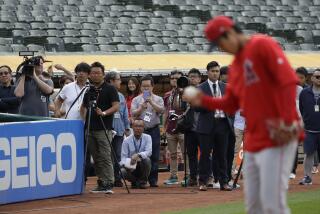Audacious Congressman Is Shaking Up Japan’s Troubled Socialists
TOKYO — The man blamed for--or credited with--forcing Japanese Prime Minister Tomiichi Murayama to abruptly resign last week has spent far more time as a mathematics professor in America than as a politician in Japan.
Socialist congressman Tadatori Akiba cites an American Revolution maxim, refers to Euclidean geometry and compares Japanese bureaucrats to Windows 95--impenetrable icons shielding the essential structure--in political speeches delivered in flawless English.
And Akiba, 53, had the temerity to take on the nation’s premier and sitting Socialist chairman by announcing he would run against Murayama in the party election beginning Sunday. His decision is cited as a factor that pushed Murayama to resign--although Akiba discounts it and says the prime minister told him the two actions were unrelated.
Nonetheless, his audacious act drew veiled threats from party elders. One called him an upstart “youth”--Akiba has served in politics only five years--and advised him to start from the bottom to preserve his promising future. Another official was more blunt, accusing him of “throwing dirt on Mr. Murayama’s career.”
Akiba hardly blinked.
“Those comments show their lack of understanding of democracy,” he said in an interview crammed between telephone calls and TV appearances this week. “An election is where people’s voices are reflected in the system. That is very sacred.”
With his laser-beam logic and rational analyses, Akiba pinpoints many of the weaknesses of Japan’s body politic. But how well his message translates here is a question even he has trouble answering.
His ideals of an open society managed by citizens and protected by rules of justice are textbook Americana, but Japan is a nation still heavily governed by seniority, order and an oblique decision-making process controlled by small groups of elites.
Still, Akiba asserts that many Japanese are deeply dissatisfied with the present order, and he may be right. Voter support for traditional parties has plunged; the voting rate is at an all-time low; and more than 60% of those surveyed in a recent poll said Japan’s democracy is not working properly.
Voters rejected establishment candidates in Tokyo and Osaka gubernatorial elections last spring, and they have been outraged by official incompetence in connection with recent financial scandals and a nuclear-reactor leak.
The discontent extends to the Socialists; it has fired Akiba’s candidacy into a battle to take back the party’s soul. In the past two years, the party has lost 20,000 members, or 15%, as Murayama and other leaders stunned and disillusioned them by reversing each of its major principles in order to take power with its erstwhile conservative rival, the Liberal Democratic Party.
The policy turnabouts--on such issues as the U.S.-Japan security treaty, Japan’s military forces and nuclear power--were hatched without rank-and-file members being given an opportunity to weigh in, Akiba said.
“For many people, the [Socialist] party stood for what was right, not because it was connected to money and power,” Akiba said. “But that party is gone.”
Akiba was born in Tokyo on Nov. 3, 1942, and spent a year at an American high school before entering Tokyo University, the nation’s top academic institution. There he obtained undergraduate and graduate degrees in mathematics, and he then earned a doctorate at the Massachusetts Institute of Technology. He taught for 17 years at Tufts University in Massachusetts and the State University of New York at Stony Brook.
In 1987, he returned to Japan with his American wife and family. He wrote books, including “How to Be Friends With Americans,” worked as a TV newscaster and in 1990 won election to parliament from Hiroshima.
His American education--and friends--deeply influence his thought. On the eve of an appearance Wednesday before foreign correspondents, Akiba was on the phone with a U.S. scholar hammering out details of his speech, while an American volunteer was pounding away at the draft on a computer.
“Say something American: It is time for us to get off our duff--D-U-F-F--and do something,” advised Robert Orr, a senior research fellow at Temple University here.
Akiba made no declarations about duffs, but he did quote the Revolutionary principle of no taxation without representation and recalled how he would sneer along with his American classmates at the Soviet political system: elections with only one candidate.
Despite the risk to his political career and his dismal chance of victory, Akiba says he took on Murayama to make his party practice true democracy, with the clash of ideas that comes from a contest involving multiple candidates.
Akiba wants to see a greater sense of right and wrong in Japan, a firm moral compass he says the nation lacks because of weak religious convictions, an unformed sense of itself and the absence of inviolable laws.
“I’d like to emphasize the importance of the principle of truth and justice--some kind of value that must become the backbone of Japanese politics,” he says.
More to Read
Get the L.A. Times Politics newsletter
Deeply reported insights into legislation, politics and policy from Sacramento, Washington and beyond. In your inbox three times per week.
You may occasionally receive promotional content from the Los Angeles Times.











